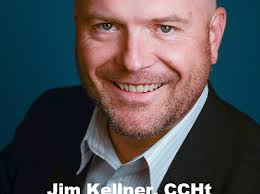Use Failure as a Tool for Correction
I don’t even remember when I wanted to become a hypnotist, but I know it goes back to at least my early teens. At 18, I tried to hypnotize my younger sister using a library book.
After learning hypnosis (but not having the confidence to work with others), and using it myself for over a decade, at age 43, I finally began working professionally as a hypnotherapist.
I performed my first comedy stage hypnosis show at 44.
What made you decide to finally realize your lifelong dream?
In my career, I bounced around a lot. I worked in sales, waited tables, was an actor and I attended massage school. I was a massage practitioner for a long time. I also had acting gigs and then tried standup comedy. I still wasn’t sure if hypnosis was viable profession. I practiced it and found out it worked.
I weighed 270 and lived in an attic apartment. I never ate fruits or vegetables unless they were fried or baked in a pie. When I actually decided to exercise, lose weight and eat better, I realized hypnosis actually does work. I got the confidence to do it since it worked on me. There is a nationwide chain of hypnotherapy clinics. I sent in my resume and they hired me.
What were the specific obstacles that you faced?
There were a lot of obstacles. My own limiting beliefs was my biggest challenge. When I was around 22 I attended a group hypnotherapy to quit smoking, and I did. I also gained 60 pounds in a year… so I started smoking again to take the weight off. You have to see the hypnotist more than once. I would use it from time to time, but not regularly. I thought, ‘Who was I to help other people even when I am living an unhealthy life?’
I had to figure out how to get into the business. How do you get that first client? There’s a National Guild of Hypnotists and I asked other hypnotists who were not very helpful. They would tell me to buy their book or take their class.
Money was an obstacle. At that time I was working part time for 20 hours a week. I didn’t have the money to open an office or advertise my services.
One of the big obstacle is as a performer, I wanted to quit all the time. Anyone who puts anything out in the world, is always facing rejection. Why do I put myself through this? But there’s no other feeling like that high you get when you’re successful.
What helped you get through them?
I hypnotize myself. Even before I started using it, I can remember my first monologue on stage, I felt as though I was going to die in front of the class. The need to express is the only way I can be happy. It’s a big desire.
Anchoring helps me to remember how good I felt at that moment when I felt great walking off stage. It pumps me up right away to get that feeling again. Based on the same theory of a song on vacation and you hear that song again and it reminds you of that moment. I bring it back whenever I need it.
Were there people that tried to discourage you?
No one overtly tried to. There was a few people that will say, ‘Wouldn’t it better to have a regular job? I can’t be around negative people. I don’t associate with them. I don’t need the energy.
For the most part, everyone is neutral or absolutely positive. To some, entertainment may be frivolous, but I’m giving back to people something that’s kind of dramatic or amazing. If they are feeling depressed I help lift them up.
How did you feel when you finally accomplished your lifelong dream?
Thank God I finally did it. What can I do next? I want to be like Tony Robbins and inspire people. My whole mission is to entertain, educate and motivate. I want to educate them on how they can live their dream and have a better life. I felt the satisfaction that I reached it. I have extra confidence.
Some people beat themselves up and say, ‘I should have done it when I was 20.’ It doesn’t matter when you do it. Just do it.
I was 13 and wanted to learn to be a stage hypnotist. I wish I could have done that at 13. At least I have 20-30 years left. If I didn’t do it I would have 20-30 miserable years.
What advice would you give to others that are contemplating finally living their dream?
There’s a great book that I never read and thumbed through called Feel the Fear and Do It Anyway by Susan Jeffers. I have people come to me to be hypnotized so they can be better public speakers. We’re all afraid. There are dozens of performers and nearly everyone is afraid to speak in front of people. I am going to do a show and saying to myself, why am I doing this?
Most everybody is feeling the same. That fear is an inhibitor.
Failure is only feedback. Use it as a tool for correction. Figure out what doesn’t work and do something different. Now you know what not to do the next time.
To learn more about Jim and the Jim Kellner experience, click here.

















No comments yet.